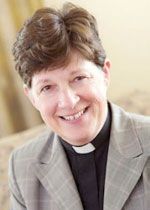“Uncertain Times”
Between 1527 and 1529, Martin Luther wrote and composed his famous hymn “A Mighty Fortress Is Our God.” He based the text of this hymn on Psalm 46: “God is our refuge and strength, a very present help in trouble” (verse 1).

Luther knew about trouble. He had been excommunicated by the church and declared an outlaw by the emperor. The bubonic plague had returned to Wittenberg, Germany. His 7-month-old daughter, Elisabeth, had died. Western Europe was under attack by the Ottoman Empire. Civil unrest resulted in the Peasants War, which was brutally crushed by the nobility. Luther lived in uncertain times. It’s unlikely that Luther could see with certainty in 1527 how his work would turn out. The Reformation wasn’t a glorious march of unbroken progress. It was messy. The “Reformers” argued with each other. It was violent. It had its share of hateful and divisive rhetoric. Anathemas were levied by all sides against each other. Even at the end of his life, Luther wondered if he had been right, if he had been faithful to the word.
If it wasn’t apparent to Luther and others what was happening, it was clear that something was happening. The world was changing. Political and religious turmoil wasn’t going on in a vacuum. This was a time of new technology—the printing press—and scientific discovery—Copernicus kicking Earth out of the center of the solar system (Luther wasn’t impressed). What new world was emerging? What new thing was God calling into being? How was the Spirit calling and shaping the church to be a clear witness?
If it wasn’t apparent to Luther and others what was happening, it was clear that something was happening. The world was changing.
Five hundred years later we find ourselves in uncertain times. We are in the middle of a pandemic. We have been sheltering in place for months. Thousands have been newly awakened to racial inequity in our society and are marching for change. Education has been disrupted. Worship has taken on new forms. Our homes have become our offices and classrooms. The world is changing and the rate of change in the past five months is unprecedented.
Ours is also a time of new technology and scientific discovery. We are wired and plugged in. Communication is instantaneous. Our cellphones can be used to keep us connected and informed. They can also be used to divide and deceive. Something new is emerging. The world is changing. We will not be able to return to the world of the pre-COVID days. Change brings loss. Loss brings grief. Yes, we believe in the Resurrection, that God brings life out of death, something new out of the old. But it can be painful, especially when we’re in the middle of it and can’t see clearly how it will all turn out. Psalm 46 captures the turmoil of Luther’s day and of ours: “The nations are in an uproar, the kingdoms totter” (6). It describes a changing earth, shaking mountains and roaring waters.
But Psalm 46 is also a song of faith—God’s and ours. God is faithful to God’s promises and to God’s people. God is a mighty fortress who fights by our side with weapons of the Spirit. Luther ends the hymn by declaring: “Were they to take our house, goods, honor, child, or spouse, though life be wrenched away, they cannot win the day. The kingdom’s ours forever!” (Evangelical Lutheran Worship, 504).
I believe we are on the brink of this new thing that God is bringing about. We don’t need to see how it will all unfold. We just need to be ready and willing to answer God’s call and be shaped by the Spirit. Secure in God who is our refuge and strength, we can be bold in our witness. God is activating each of us to invite more people into the way of Jesus—the way of grace and mercy, the way of justice and peace, the way of life.
The Rev. Elizabeth A. Eaton
Presiding Bishop
Evangelical Lutheran Church in America


